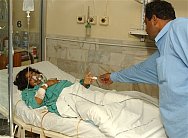Pakistani Teen Recovering After Being Shot
 The Associated Press
The Associated PressMay 2, 2006
Pakistani Teen Recovering After Cousins Shot Her in Attempted 'Honor Killing'
By ZARAR KHAN
KARACHI, Pakistan - Suffering from five bullet wounds, Noor Jehan calls out in pain for her mother. The 14-year old Pakistani girl is recuperating slowly in a hospital from a brutal attack allegedly carried out by two male cousins to avenge a rebuffed marriage proposal.
But neither her mom nor her other relatives could be found all apparently scared into hiding by the attempted "honor killing." The only people close enough to hear her cries are the four police officers guarding her room.
Honor killings claim hundreds of lives each year in this conservative Muslim nation. The targets include wives accused of having affairs, young women who refuse a marriage partner, and brides and grooms marrying without family consent. The crimes are usually committed by male relatives and most go unpunished.
Jehan's case is particularly gruesome.
Police said she crawled out of a ditch after being shot four times in the legs and once in the abdomen in the eastern outskirts of Karachi on April 18. A passer-by called police.
"They shot me with several bullets ... I fell in the ditch and they drove away," Jehan said from her bed in Jinnah Postgraduate Medical Center. "They thought I was dead but ... somehow I got the courage to come out of that ditch."
She spoke to The Associated Press late last week, but doctors said she was back in intensive care after undergoing surgery Monday to combat an infection in the wound in her abdomen.
Jehan said her cousins Khadim and Sajan Lolai attempted to kill her after her father refused to let her marry Khadim, who was wanted by police in other murder and kidnapping for ransom cases.
She said that days after her father's refusal, the cousins accused her of illicit relations with the son of the landlord of her father's farm fields in Ratu Dero, a poor village about 250 miles east of Karachi.
The diminutive teenager said she had not done anything wrong. "They blamed me ... they maligned me just to avenge my father's refusal to give my hand to" Khadim, she said.
Jehan said her family fled to Karachi to live with a friend after they heard rumors unconfirmed by police that the landlord's son was murdered, too. They feared they could be next.
But somehow the cousins found out.
"Our car was stopped by Khadim and Sajan when we entered Karachi," Jehan said. "My parents, younger sister and three younger brothers were taken away in another car, and then they shot me."
Police have not found any trace of the two cousins and a third assailant who allegedly shot Jehan. Nor have they been able to locate Jehan's family members, although they doubt they have been killed, as such "honor" crimes don't usually target other family members.
Dilawar Hussain, a Karachi police officer, said finding the parents would help police with their investigation and lead to a faster recovery for Jehan.
Last year in Pakistan, 563 married women, 373 men, 75 unmarried girls and six other children died from honor killings, according to a report by Lawyers for Human Rights and Legal Aid, a women's rights group, which runs a telephone hot line for victims of violence.
Pakistani laws often give short shrift to women. A woman who is raped, for instance, has to have four witnesses to prove her claim; if she fails she could be charged with adultery.
But Zia Awan, the head of Lawyers for Human Rights and Legal Aid, said Pakistan has obligations under international law to guarantee women's fundamental rights. "There is a need to abolish the practice of honor killings across the country ... through a permanent statutory body in order to afford equal protection and dignity to women and girls," Awan said.
Pakistani leader Gen. Pervez Musharraf has periodically made strong speeches against honor killings in Pakistani society, while incremental steps have been made to improve women's rights in other ways, by encouraging their participation in politics and the armed forces.
Yet Awan said that despite Musharraf's promises to repeal discriminatory laws against women, no real changes have taken place.
The treatment of women in Pakistan has received much international attention in recent years in part because of a villager named Mukhtar Mai, who was gang-raped at the orders of a tribal council as punishment for her 13-year-old brother's alleged affair with a woman from a higher caste. Mai and her family deny any affair ever took place, saying the brother was in fact sexually assaulted by members of the other family.
Mai braved social stigma by going public with her 2002 assault, landing her alleged attackers in the national courts of Pakistan.
A trial court in 2002 sentenced six men to death and acquitted eight others in Mai's rape. In March, the High Court in Punjab province acquitted five of the men and reduced the death sentence of the sixth to life in prison. After an emotional appeal by Mai, the acquittals were overturned in June and the 13 men who had been released were arrested again.
They remain in jail while Pakistan's Supreme Court considers the case.
Jehan's story has also received media attention, leading hospital officials to move her from a crowded hospital ward to a more comfortable suite. But the teen remains alone.
"Here I feel better and protected, but I don't know when my mother, my family will come," she said.
Copyright © 2006 ABC News Internet Ventures

0 Comments:
Post a Comment
<< Home